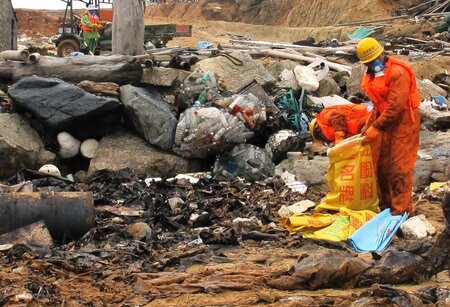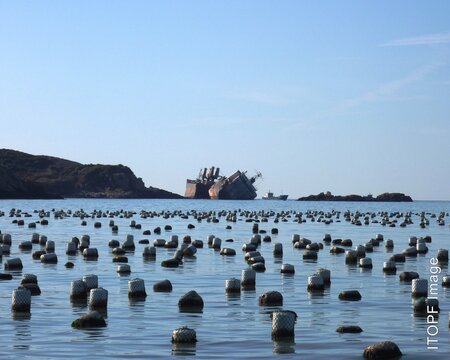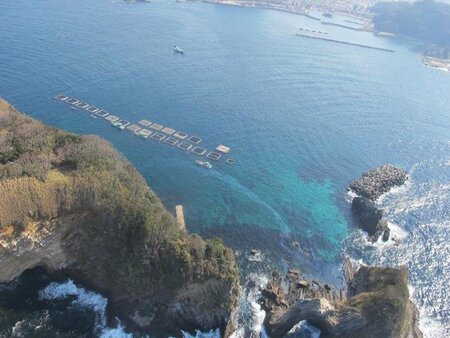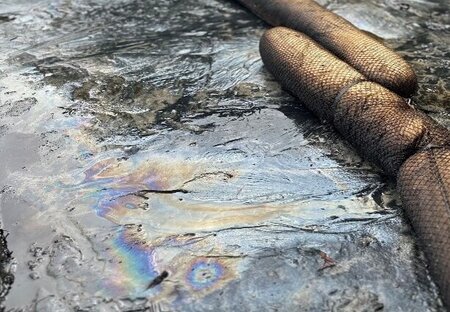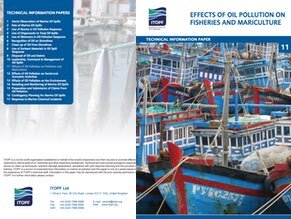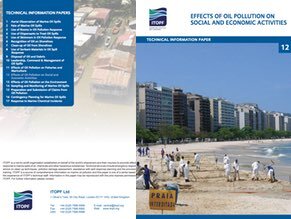Economic Effects

Contamination of coastal areas with high amenity value is a common feature of many oil spills. In addition to costs incurred by clean-up activities, serious economic losses can be experienced by industries and individuals dependent on coastal resources. Usually, the tourism and fisheries sectors are where the greatest impacts are felt. However, there are also many other business activities and sectors that can potentially suffer disruptions and loss of earnings.
Tourism
Disruption of recreational activities such as swimming, boating, angling and diving caused by oil contaminated shores is usually relatively short-lived. Once shorelines are clean, normal trade and activities would be expected to resume. However, more long term and damaging economic impacts can occur when public perception of prolonged and wide-scale pollution remains long after the oil has gone. In these circumstances, it takes an even longer period for business activities to return to normal, sometimes with far reaching consequences. For example holidaymakers may decide to book holidays in other regions in which case hotels, tour operators and potentially their suppliers may suffer losses. This may also affect transport companies, national parks and other local, tourism-dependent businesses. In some cases, a combined strategy of regional advertising and promotional campaigns may help to counteract the degradation of the image of an affected area caused by continued negative publicity.
The most vulnerable business will be those that have no alternative means of income. For example, a luxury resort may be unable to continue operating as it is dependent on tourists for all of its income. On the other hand, a supermarket or café that makes a large proportion of its earnings from holidaymakers would still retain a proportion of its business from local residents.
A company that is wholly dependent on tourists may still be able to find an alternative source of income. For example, a hotel may provide food and lodging to responders of the incident. In some cases, there may be response personnel on site for many months and the losses caused by an absence of tourists may therefore be negligible for these businesses.
In summary, a return to normal trade for the tourism sector requires not only an effective clean-up programme, but also a strategy to restore any loss of appeal to tourists that the area may have suffered.
Fisheries and Mariculture

Oil spills can cause serious damage to fisheries and mariculture resources. Physical contamination can affect stocks and disrupt business activities by fouling gear or impeding access to fishing sites.
The extent to which economic impacts will be felt by the fisheries sector following an oil spill will depend on a number of factors such as: the characteristics of the spilled oil, the circumstances of the incident and the type of fishing activity or business affected. The physical (environmental) characteristics of the marine environment and coast also play a role in determining the range and extent of economic impacts. Similarly, the extent to which market confidence in the quality of seafood from the affected area is lost is also a major factor.
Read more
The impacts of an oil spill on fisheries and mariculture activities can be categorised as direct or indirect. Direct impacts can include contamination of the boats and gear used in catching or cultivating marine species. Damage to stocks as a result of toxic or smothering effects of the oil would also be considered a direct impact. In a few cases, the physical interaction of species with oil can result in mortalities.
Indirect impacts can be observed through the interruption of fishing activities due to the presence of oil or clean-up operations.
In some cases, in order to preserve market confidence and to protect fishing gears, fishing or harvesting bans may be imposed or voluntarily implemented. In other cases, although less commonly, fishing and harvest bans are imposed as contamination in seafood exceeds acceptable limits.
When a fishery has reportedly suffered losses following a spill, in order to facilitate the compensation process, all damages will need to be documented and where possible supported by evidence. This will often require rigorous scientific sampling and analysis. Nevertheless, even where scientific approaches are taken, it is often difficult to separate the effects of an oil spill from other factors, eg over-fishing and industrial pollution. Therefore, in order to make the best assessment of damages caused by a spill, it is necessary to make comparisons of the post-spill recovery with the pre-spill status of the fishery.
What Other Industries/Businesses Can be Affected by Marine Oil Spills?
Heavy industry that relies on seawater for normal operations can be at high risk, particularly if water intakes are close to the surface. If such plants are responsible for meeting needs on a national scale, disruptions can be far reaching. Other types of coastal industry such as shipyards, ports and harbours can also be disrupted both by oil spills and subsequent clean-up operations.
In some countries, smaller scale commercial activities can suffer severe impacts following oil spills. For example, communities may be economically reliant on salt production through the evaporation of seawater which is vulnerable to oil contamination.
Businesses that rely on marine recreational activities may also be affected. For example, marinas and harbours are usually protected by sea defence structures that can be difficult to clean once oiled and can therefore impede a rapid return to normal business activity.
There is a long list of the types of economic activities that may be affected by oil spills. The most important factor to consider is the extent to which local populations are dependent on the business. Where feasible, contingency plans should consider measures that could be used to mitigate impacts.
How Long After an Oil Spill Will the Economic Impacts Persist?
Due to the nature of oil spills, it is impossible to predict for how long after a spill the economic impacts will persist. Physical impacts will often persist until the majority of oil has been removed by clean-up operations. Unfortunately, where tourism or fisheries are concerned, the consequences are more long-lived due to the effects of negative publicity and persisting public perceptions. A thorough, regularly exercised contingency plan, which takes into account the economic profile of a particular area, will help identify the most effective measures that can be undertaken to minimise the economic effects of an oil spill.
Explore Documents on Economic Effects
A case for incorporating Environmental Social & Governance (ESG) into spill response
Over recent years the shipping industry has begun to discuss issues relating to sustainability, often within the framework of Environmental, Social and Governance (ESG). In the context of ship-source pollution response, there is debate over how ESG can be practically incorporated into this emergency response sector, and concerns that it’s inclusion may lead to increased bureaucracy and higher workloads at moments when time is already at a premium. This paper therefore examines the feasibility and usefulness of monitoring sustainability during maritime pollution response, and provides practical recommendations on how ESG considerations can be tailored to the spill response sector.
Categories: Environmental effects, Economic effects, Planning & operations, Papers
Implementation of oil spill mitigation measures in fisheries and mariculture (2017)
Response actions and mitigation measures, undertaken at the time of a spill specifically to protect seafood resources can ultimately influence the duration, magnitude and extent of impacts. This paper reviews small-scale cases in which ITOPF has been involved from around the world where fisheries or mariculture were an important concern and where measures were implemented specifically to mitigate damage.
Categories: Economic effects, Papers
Response considerations when marine spills affect coastal agriculture (2017)
Using case studies of oil spills ITOPF has attended in Asia, Europe and South America, this paper will discuss these key considerations in turn, and describe, through the case studies, how they were resolved or addressed. This paper will also summarise the findings to provide general guidance for responding to oil spills where tidal agriculture is an important industry.
Categories: Economic effects, Papers
The Financial Cost of Oil Spills - a review of international cost data and the factors affecting the costs of oil spills from ships
Oil spills pose significant ecological, social, and economic consequences. The response to a spill and the effects of pollution damage can give rise potentially to high costs. The financial risk of an oil spill is consequently of immense interest to policy makers and the organisations involved in funding and providing compensation and in determining risk and liability.
Categories: Economic effects, Papers
TIP 11: Effects of oil pollution on fisheries and mariculture
This paper describes the effects of ship-source oil pollution on fishing and mariculture and provides guidance on response measures and management strategies which may help to reduce the severity of oil spill impacts. Damage to other economic resources is considered in a separate Technical Information Paper.
Categories: Environmental effects, Economic effects, Technical Information Paper (TIPS)
TIP 12: Effects of oil pollution on social and economic activities
This paper considers some of the effects of oil spills on a variety of coastal industries and social activities and considers measures which might reduce their impact. Given their particular importance, the effects of oil spills on fisheries and mariculture are considered in a separate Technical Information Paper.
Categories: Economic effects, Technical Information Paper (TIPS)

